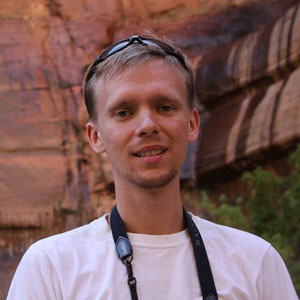Location: Washington, D.C., USA
Current Gig: Online Producer/Designer for Editorial Projects in Education in Bethesda, Md. (http://www.edweek.org)
Member Since: June 2011
Six-word Memoir: “A life unexamined isn’t worth living.”
Favorite Tech Tool: WordPress
Favorite fictional character: Jean-Luc Picard from Star Trek: The Next Generation.
What’s your daily routine?
I co-direct and co-manage multimedia projects for Education Week, a weekly newspaper focused on education policy and teaching. Our schedules vary often, but I’m responsible mostly for producing content for video projects and interactive features. I work with a small team of other producers and programmers and brainstorm ideas for new online projects with our talented print reporters.
Why did you choose online news?
I wouldn’t say I really “chose” to get involved in online news; I got here through a gradual process of growth, learning and adaptation. I started as a “traditional” newspaper reporter in 2007 and picked up skills in video and audio storytelling as I went along. It wasn’t so much a choice as it was the necessity to adapt and stay current. Nevertheless, I wouldn’t say that these changes were unwelcome; in fact, the concept of multimedia storytelling tapped into a love of technology and innovation for me. Change is fun! Exploring and trying new things is the essence of what we’re doing as online journalists right now.
Why are you drawn to education?
For starters, teachers almost always make great subjects! They have so many great stories to tell and are by definition people-oriented. A great ingredient for a compelling video story, indeed.
My international involvement began when I went to graduate school at the University of Miami. It’s a multimedia journalism master’s program with a strong focus on working in other countries (before Haiti I had traveled to South Africa and Europe for reporting projects as part of the curriculum). But my trip to Haiti would not have been possible without the support of the Pulitzer Center on Crisis Reporting, which was crucial in supporting my efforts to travel to Haiti and getting the word out about the work I did there.
But more than that, Haiti is a place where a lot of focus in the news is on the earthquakes, death tolls and natural disasters. It is true that Haiti has a lot to recover from and while reconstruction is an important topic, it fails to emphasize the fundamental problems Haiti faces as a state. The paramount issue for Haitians right now is education reform. As a visual storyteller, I wanted to empathize with Haitian concerns and their point of view as best as I could. Focusing on education was the right decision.
Consider that barely more than half of all Haitians know how to read, and when compared to other Caribbean countries (even the Dominican Republic, which borders Haiti), that figure is even more abysmal. In addition to rebuilding infrastructure, education is ultimately the key for a long-term Haitian recovery. Keeping a near majority of people in utter privation and ignorance is no recipe for building a successful nation-state. By having minds that are lucid and knowledgeable, the needs of government and society change dramatically. A proper education system in Haiti will act as a big part of delivering that.
What are the challenges involved with an international project?
International projects bring a whole new set of challenges to reporting, especially when you’re dealing with different languages (in my case, French and Haitian Creole). The things we take for granted in the States — cell phones, e-mail, any form of instant communication — do not apply to places such as Haiti. Pre-production plays a key role in successfully getting projects done in other countries. Making connections with NGOs with a strong presence on the ground is crucial. Contrary to what you might expect, Haiti is also a very expensive place to go. Basic services, such as transport, do not come cheaply. Paying your guide and driver well is a must. So having an external source of funding for these projects is also very important.
What is the most challenging part of telling someone else’s story?
Establishing a connection with the person you’re interviewing is always the hardest part. You need to make the people trust you. Do you show that you have their best interests in mind? Once a sense of trust is established, a person will open up to you and be frank about their feelings and experience. It also goes a long way to getting the right access to tell the story visually. Ultimately, you need to sell the story idea to the person you’re working with.
If you had a million dollars dedicated to improving media, you would …
I would go around to the smaller and mid-size newsrooms in the country and try to show them that investment in multimedia production shouldn’t have to be prohibitive. The knowledge and information to create multimedia departments needs to be readily available to everyone. Letting major media companies take all the slices of the pie is a bad idea. Innovation and progress comes when many voices are involved.
The beauty of where our profession is going is that we no longer have to be saddled by the burden of traditional infrastructure costs. All it takes is a small team of talented folks and a drive to produce something truly great.
(All images via Paul Franz.)


